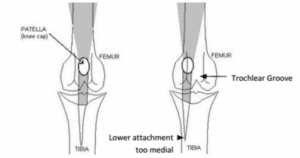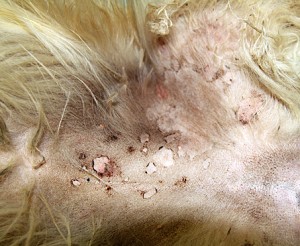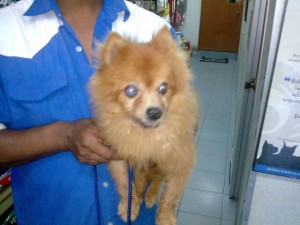Pomeranians are known to be a hardy breed, generally healthy and full of life. However, like any other dog breed, they can face specific challenges. Pomeranian health issues can become more noticeable in rescue dogs or those from less reputable breeding situations, such as puppy mills. The goal of this post isn’t to scare potential Pomeranian parents but rather to inform and empower you. By learning about these common problems, you’ll know what to watch for, allowing you to address issues early and keep your Pomeranian healthy and happy.
1. Collapsed Trachea: A Common Respiratory Issue
 Among the most common Pomeranian health issues is collapsed trachea. The trachea, also known as the windpipe, plays a vital role in breathing. In Pomeranians, the cartilage rings that keep the airway open can weaken either through genetics or repeated pressure from collars. When the trachea collapses, it creates a caving-in effect that restricts airflow, making breathing difficult for your dog. If left untreated, this condition can be life-threatening.
Among the most common Pomeranian health issues is collapsed trachea. The trachea, also known as the windpipe, plays a vital role in breathing. In Pomeranians, the cartilage rings that keep the airway open can weaken either through genetics or repeated pressure from collars. When the trachea collapses, it creates a caving-in effect that restricts airflow, making breathing difficult for your dog. If left untreated, this condition can be life-threatening.
To avoid this, switch to a harness instead of a collar. Harnesses protect their delicate necks, reducing the risk of damage. Regular exercise is also essential since obesity can worsen the condition. Keeping your Pomeranian at a healthy weight can significantly lower the chances of developing this problem.
2. Patellar Luxation: Knee Cap Displacement
 Another one of the common Pomeranian health issues is patellar luxation. This condition occurs when the kneecap shifts out of its normal position, causing pain and mobility issues. When our “Little” Sophia came home, we noticed that she walked with an awkward gait, almost as if she were on stilts. It turned out she had patellar luxation in both knees, but due to her age, surgery was no longer an option.
Another one of the common Pomeranian health issues is patellar luxation. This condition occurs when the kneecap shifts out of its normal position, causing pain and mobility issues. When our “Little” Sophia came home, we noticed that she walked with an awkward gait, almost as if she were on stilts. It turned out she had patellar luxation in both knees, but due to her age, surgery was no longer an option.
If you notice your Pomeranian limping or walking unusually, consult your vet promptly. Early detection makes managing or correcting the issue with surgery or physical therapy easier. The sooner you take care of this condition, the better the outcome.
3. Hypothyroidism: A Sluggish Metabolism
 Hypothyroidism is another example of Pomeranian health issues that owners should be aware of. This condition occurs when the thyroid gland does not produce enough hormones, slowing the dog’s metabolism. Symptoms include lethargy, weight gain, hair loss, and dry skin. If left untreated, hypothyroidism can affect your dog’s overall well-being and quality of life.
Hypothyroidism is another example of Pomeranian health issues that owners should be aware of. This condition occurs when the thyroid gland does not produce enough hormones, slowing the dog’s metabolism. Symptoms include lethargy, weight gain, hair loss, and dry skin. If left untreated, hypothyroidism can affect your dog’s overall well-being and quality of life.
A vet diagnosis is essential if you notice these signs. Hypothyroidism is usually managed with medication and lifestyle adjustments, ensuring your Pom stays healthy and active.
4. Eye Problems: Distichiasis and Cataracts
 Eye-related Pomeranian health issues are also quite common, particularly distichiasis and cataracts.
Eye-related Pomeranian health issues are also quite common, particularly distichiasis and cataracts.
- Distichiasis happens when extra eyelashes grow inward, irritating the eye. This can cause your Pomeranian to squint or paw at their face frequently. Fortunately, a simple electrolysis procedure can remove the offending eyelashes and provide instant relief.
- Cataracts are common in aging Pomeranians. This condition clouds the lens of the eye, leading to vision loss and sometimes blindness. Our beloved Mika struggled with cataracts in her later years, making it difficult for her to navigate stairs or judge distances. Early detection and veterinary care can help manage this condition and may even allow for corrective surgery.
5. Skin and Coat Issues: Alopecia and Black Skin Disease
Pomeranian health issues often extend to skin and coat problems, with alopecia and black skin disease being two of the most prevalent.
- Alopecia causes patchy hair loss, usually around the neck or tail. Though not painful, it can be a sign of stress or other underlying health problems.
- Black Skin Disease results in hair loss accompanied by darkening of the skin. While not life-threatening, it can make your Pomeranian more prone to infections and discomfort.
Proper grooming, a nutritious diet, and sometimes supplements are essential for maintaining healthy skin and a thick coat. Regular vet visits are also vital to address any emerging skin conditions early.
Stay Informed and Proactive
Knowing about common Pomeranian health issues allows you to take better care of your furry friend. While this breed is generally healthy, collapsed trachea, patellar luxation, hypothyroidism, eye problems, and skin issues are things to watch for. Early detection is critical—if you notice any unusual symptoms, consult your vet immediately.
For more tips on raising a healthy Pomeranian, check out my book, A Pommy Mommy’s Guide… to Being Owned by a Pomeranian. With the proper care, you can ensure that your Pomeranian lives a long, happy life filled with love, cuddles, and plenty of spoiling. Understanding these Pomeranian health issues will make you a more prepared pet parent, giving your furry companion the best chance at a healthy, joyful life.
Related Posts:
Pomeranian Health: How to Keep Your Pom Healthy
Collapsed Trachea in Pomeranians
Black Skin Disease in Pomeranians
